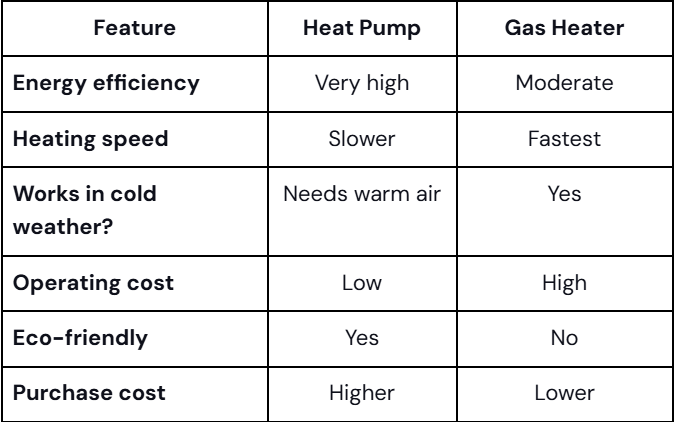Your pool doesn’t have to sit cold on chilly days—choosing the right heater can keep it swim-ready all year long. But selecting the right heating system can feel confusing. Should you go with a heat pump or a gas heater? While both have their strong points, one may simply be a better fit for your lifestyle and budget than the other. If you’re specifically comparing swimming pool heat pumps for your pool, here’s a clear and friendly guide to help you decide.
How Do Heat Pumps and Gas Heaters Work?
Before choosing the swimming pool heater, understanding how each option works when it comes to warming the water is beneficial. Their way of producing heat differs a lot in cost, time, and efficiency.
Heat Pump: Heating Through Air, Not Fire
Unlike flame-based heaters, swimming pool heater pumps do not create heat. Instead, they employ the heat transfer process:
– It extracts heat from outside air
– compresses that warmth
– then transfers heat to the pool water using a pool titanium heat exchanger
– During this process, the pool circulation pump keeps the water moving through the system
Because the heat pump relies on outdoor air temperature, it works best in climates above 45°F (7°C).
Gas Heater: Quick Heat Using Combustion
A gas heater uses propane or natural gas to warm up the water. The heat exchanger coils get heat from flames, and the warm water flows back into the pool.
Thanks to pure combustion, it has the ability to quickly heat up water, even on cold days.
Heat Pump vs Gas Heater: Side-by-Side Comparison
Here’s a quick look at how these systems compare on the factors that matter most:

1. Heating Performance
Heat Pump Performance
Pool heat pumps are consistent. They may warm your pool gradually, but they maintain the temperature incredibly well. The efficiency of heating element performance greatly depends on the water flow rate and the outdoor temperature.
Gas Heater Performance
When it comes to speed, gas heaters are king. If you want the pool heated today, not tomorrow, a gas heater can raise the temperature 1–3°F per hour, depending on the size of the heater.
2. Energy Efficiency and Cost Savings
Heat Pump Efficiency
Heat pumps are indeed very efficient in electricity use. They usually provide a heat output of 3 to 5 units for every 1 unit of electricity input as they transfer heat and do not produce it.
– The performance of heat pumps is measured in terms of the Coefficient of Performance (COP).
– A COP of 5 means that if you use 1 unit of electrical power, you receive 5 times more heat energy.
Hence, the pool heat pumps can bring up to 75% savings against gas heating expenses.
Gas Heater Running Costs
Gas heaters burn fuel, which quickly becomes expensive.
– So monthly operating costs can be 3–5× higher than those of heat pumps
– Rising fuel prices worldwide.
If the pool is heated regularly, a gas system would be a burden on the pocket.
3. Long-Term Durability and Materials
The lifetime of any pool heating system will usually depend on the material that comprises the interior parts.
Heat Pump Materials
All heat pumps use titanium heat exchangers at present; their features include:
– High thermal conductivity
– High resistance to corrosion
– Long lifespan
Titanium can last more than 15 years, even in saltwater pools.
Gas Heater Materials
The gas units frequently comprise copper heat exchangers:
– Good conductivity
– But more susceptible to corrosion
– Hard water or unbalanced pool chemicals can shorten its lifespan
If maintenance isn’t really your strong point, then a heat pump might be more forgiving.
4. Environmental Impact
Heat Pumps Are Eco-Friendly
As heat pumps do not burn fossil fuels, they are considered to be greener. They also drastically reduce greenhouse emissions.
Gas Heaters Are Not
Gas heaters either burn propane or natural gas, both of which contribute to carbon emissions.
Comparatively, heat pumps would win hands down if sustainability is the most important factor.
5. Installation and Maintenance
Heat Pump
– Easy Installation
– Minimum parts
– Low Maintenance Per Year
– Best of homeowners who use the pool regularly
Gas Heater
– Must connect to either propane or natural gas
– Installation by a professional
– Needs more frequent servicing
For a person who wants a hassle-free option, heat pumps give simplicity.
6. Best Use Cases
Choose a Heat Pump If:
– You want long-term energy savings
– You frequently use your pool
– You live in a mild or warm climate
– You like a low-maintenance heater
– You want it to be eco-friendly
Perfect Match:
A good example of a cost-effective, durable heat pump is the 30,000 BTU Above-Ground Pool Heat Pump (8000 Gallons).
Choose a Gas Heater If:
– You have to heat your pool occasionally
– You need rapid heating for last-minute swims
– You live in a cold region
– You don’t mind paying higher fuel costs
Which Is Best for Your Pool?
Each has its place: A gas heater will work in very cold climates or with those who want an immediate heating process, but for most homeowners, the heat pump offers a better balance of performance, cost, and eco-friendliness.
Why Heat Pumps Win for Most Pools
– Up to 75% less in operational costs
– Long life, attributable to titanium components
– Ideal for a permanent, consistent heat
– Very energy-efficient and eco-friendly
Gas heaters won’t be left behind, as they produce rapid heating in very cold environments. But heat pumps cost-effectively provide warm water without having to worry about the monthly bills.
Conclusion
The choice of a swimming pool heater depends more on how frequently the pool is used, the climatic conditions, and one’s budget. But with rising energy prices and increased focus on sustainability, heat pumps are quickly becoming the preference for year-round comfort.
So, whether you’re upgrading or buying a new system, think long-term—your wallet and pool will appreciate it!
